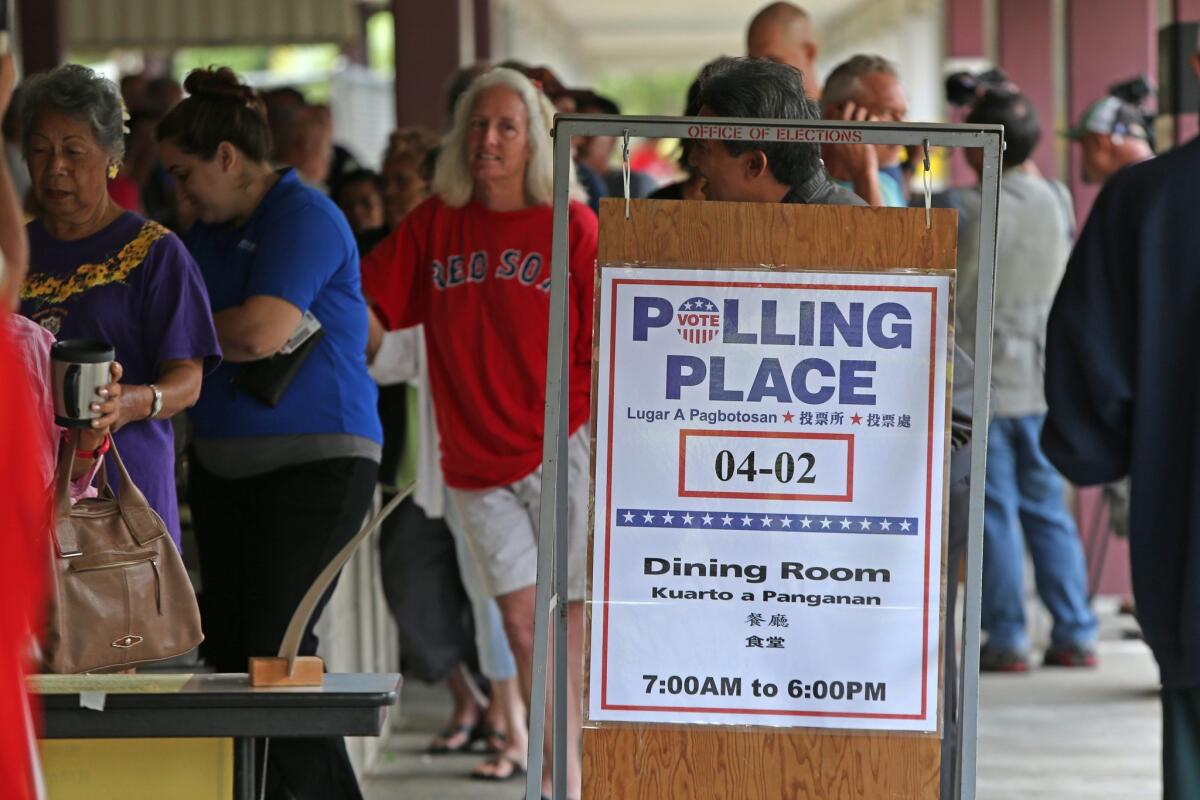Finally, the last of Hawaii’s voters cast ballots in primary

An election that stretched almost a week beyond its expected end was coming to a calm close Friday as Hawaii voters disenfranchised by Tropical Storm Iselle cast ballots that will decide a hard-fought U.S. Senate fight.
As polls opened at 7 a.m. on the Big Island, appointed U.S. Sen. Brian Schatz held a 1,635-vote lead — out of 230,000 cast — over fellow Democrat Colleen Hanabusa for the party nomination. Several other races were also on the ballot, but none had the mix of close outcome and emotional battling that marked the Senate race.
For all but two precincts, balloting ended last Saturday, the scheduled primary date. But in areas of the Puna district of the Big Island, Iselle’s landing the day before tore up roads and cut electricity, so balloting was postponed. After Friday’s makeup election was set, Hanabusa filed suit to delay it further but a state Circuit Court judge turned down her request.
Stewart Maeda, the Hawaii County clerk overseeing Friday’s election, said that to encourage voters, a shuttle system was set up to collect voters who might find it difficult to get to the single polling location, Keonepoko Elementary School.
“We’ve been having a pretty steady turnout all morning,” Maeda said in an interview with the Los Angeles Times. “We’re happily surprised.”
Of the roughly 8,200 voters eligible in the primary election, almost 1,500 cast early or absentee ballots before Saturday’s election, meaning that at most fewer than 6,800 voters were in the mix Friday. Hawaii’s voter turnout is generally low, however, meaning that the number may be dramatically smaller.
That made the election math difficult for Hanabusa, who must accomplish something she was unable to do anywhere in the voting Saturday — completely dominate Schatz. The senator, in fact, won the vote already cast on the Big Island.
The race had been fraught from its inception. Schatz, a former lieutenant governor, was appointed by Gov. Neil Abercrombie after the December 2012 death of veteran Sen. Daniel K. Inouye, who had explicitly asked that his protege Hanabusa be given the seat.
Abercrombie’s refusal—and later his criticism of Inouye’s team — set off recriminations that exacerbated the divide between the state’s two major Democratic voting blocs — white liberals who have supported Abercrombie and Japanese Americans who formed the bulwark of Hanabusa’s base. (Abercrombie lost Saturday’s gubernatorial primary in a landslide.)
With fresh tensions built into the mix, election officials went to unusual lengths to guarantee access to Friday’s voting. A shuttle picked voters up at several locations and deposited them at the polls; in another area, a van was dispatched to pick up any stranded voters.
Other voters were able to drive in as usual; the county clerk said that most areas were passable on Friday.
“There are pockets of people whose private property may be blocked but the main roads are accessible and open,” Maeda said. “Today, their access is very good. “
Voting ends at 6 p.m. local time and state elections officials expect to tally the results within hours, almost a week after they were supposed to be known.
“It’s been a long election,” Maeda said, with more than a little understatement.
For political news and analysis, follow me on Twitter: @cathleendecker
More to Read
Sign up for Essential California
The most important California stories and recommendations in your inbox every morning.
You may occasionally receive promotional content from the Los Angeles Times.










